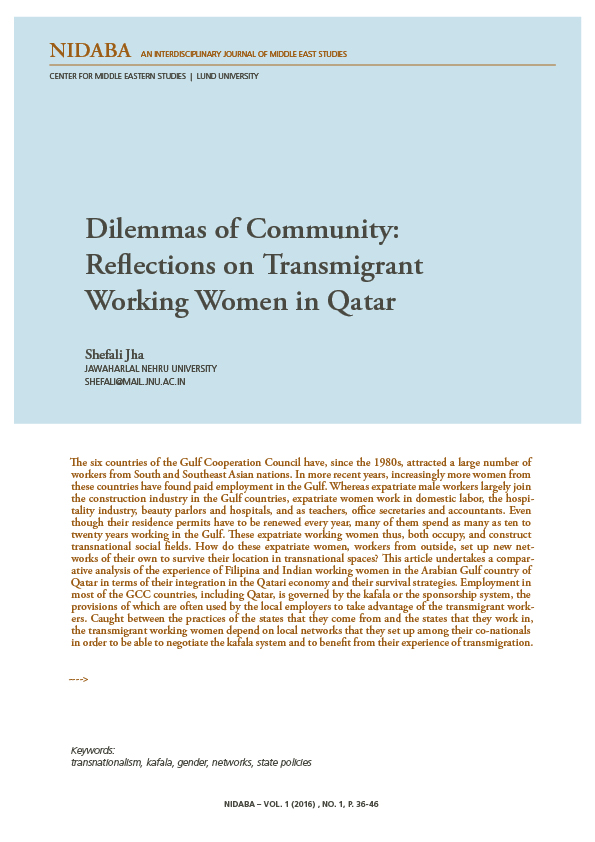Abstract
The six countries of the Gulf Cooperation Council have, since the 1980s, attracted a large number of workers from South and Southeast Asian nations. In more recent years, increasingly more women from these countries have found paid employment in the Gulf. Whereas expatriate male workers largely join the construction industry in the Gulf countries, expatriate women work in domestic labor, the hospitality industry, beauty parlors and hospitals, and as teachers, office secretaries and accountants. Even though their residence permits have to be renewed every year, many of them spend as many as ten to twenty years working in the Gulf. These expatriate working women thus, both occupy, and construct transnational social fields. How do these expatriate women, workers from outside, set up new networks of their own to survive their location in transnational spaces? This article undertakes a comparative analysis of the experience of Filipina and Indian working women in the Arabian Gulf country of Qatar in terms of their integration in the Qatari economy and their survival strategies. Employment in most of the GCC countries, including Qatar, is governed by the kafala or the sponsorship system, the provisions of which are often used by the local employers to take advantage of the transmigrant workers. Caught between the practices of the states that they come from and the states that they work in, the transmigrant working women depend on local networks that they set up among their co-nationals in order to be able to negotiate the kafala system and to benefit from their experience of transmigration.
Authors retain copyright and grant the journal right of first publication with the work simultaneously licensed under a Creative Commons Attribution License that allows others to share the work with an acknowledgement of the work's authorship and initial publication in this journal.
Authors are able to enter into separate, additional contractual arrangements for the non-exclusive distribution of the journal's published version of the work (e.g., post it to an institutional repository or publish it in a book), with an acknowledgement of its initial publication in this journal.
Authors are permitted and encouraged to post their work online (e.g., in institutional repositories or on their website) prior to and during the submission process, as it can lead to productive exchanges, as well as earlier and greater citation of published work (See The Effect of Open Access).
The journal provides open access to all accepted manuscripts in hopes of facilitating an exchange of knowldge and informed discussion about the Middle East. Publishing with Nidaba, authors agree to the terms of the Creative Commons Attribution-NonCommercial-NoDerivatives 4.0 International License, which allows others to share the work with an acknowledgement of the work's authorship and initial publication in this journal. Authors retain the copyright to their manuscript and grant the journal the right of first publication.
The content of this journal is licensed under a Creative Commons Attribution-NonCommercial-NoDerivatives 4.0 International License.

